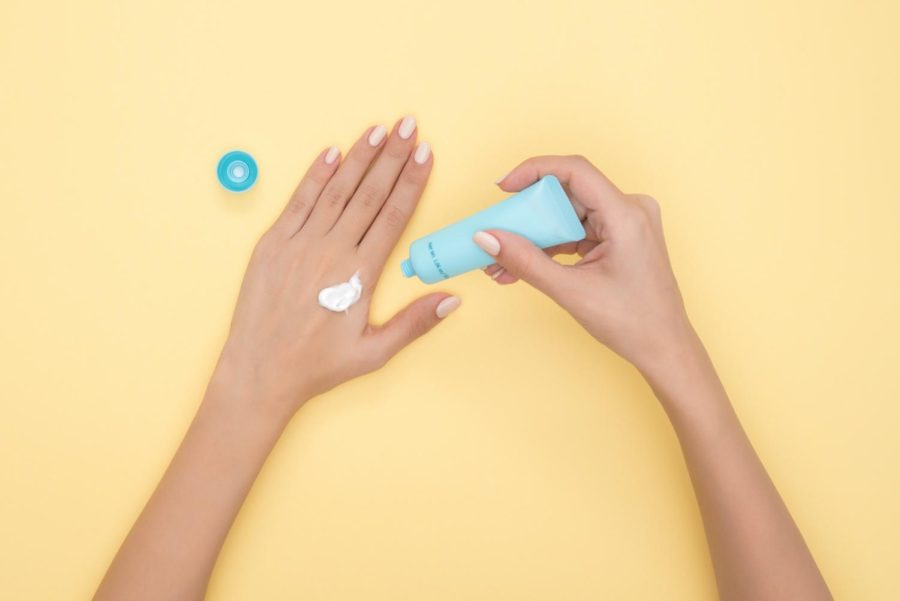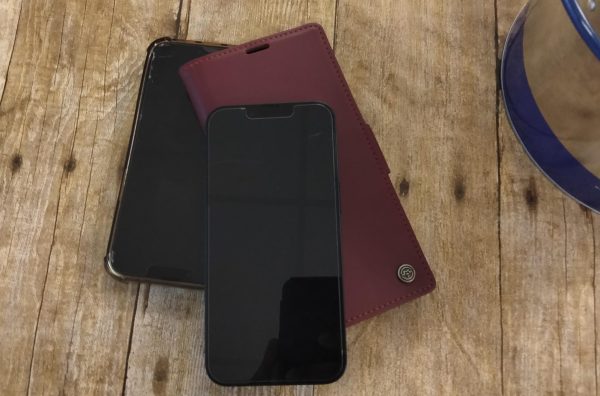Why you should start wearing sunscreen daily
Wearing sunscreen could have more benefits than most know. Check them out, along with some recommendations below! (Google Images)
Everyone knows they should wear sunscreen, and with summer approaching you’ll most likely be using it to protect yourself from the scorching sun. Most people typically wear sunscreen when they’re going to the beach or going somewhere where they’ll be in the sun for an extended period of time, which is great because you’re protecting yourself! But did you know that you should use sunscreen every day?
According to the Skin Cancer Foundation, skin cancer is one of the most common forms of cancer in the United States with more than two people dying from it every hour. Sunscreen is a simple way to minimize your risk of skin cancer, and according to dermatologists and other skin specialists, you’re probably not applying sunscreen as regularly as you should. Even if the sun isn’t out and it’s fall or winter, you should apply sunscreen whether you’re going out or sitting inside all day. But how much should you apply, and how often should you re-apply?
Why is sunscreen so important?
Sunscreen is essential for several reasons. It protects your skin against sunburn, peeling, and skin cancer. It basically shields your skin from the sun’s harmful ultraviolet (UV) rays. UVA rays and UVB rays are the two types of UV radiation that are harmful to your skin. UVA rays are linked to wrinkles and premature aging, whereas UVB rays burn your skin and are associated with skin cancer.
Types of sunscreen
There are two main types of sunscreen, mineral sunscreen, and chemical sunscreen. But what is the difference between the two?
Mineral Sunscreen
Mineral sunscreen, also known as physical sunscreen, shields your skin from the sun’s rays by forming a protective layer on the surface which serves as a physical barrier. This type of sunscreen contains minerals such as zinc oxide and titanium dioxide, hence the name. These minerals create a barrier that reflects UV light rather than allowing it to penetrate the skin. The disadvantage of this type of sunscreen is that it tends to leave a white cast on the face after application.
Chemical sunscreen
Unlike mineral sunscreens, chemical sunscreens don’t lay on the face’s surface. Instead, they contain active ingredients such as oxybenzone, avobenzone, octisalate, and octocrylene, which when exposed to UV rays trigger a chemical reaction. When the sunscreen absorbs UV rays, it converts them into heat and then releases them. This form of sunscreen feels lighter on the skin and does not leave a white cast.
What does the SPF number mean?
SPF stands for sun protection factor. On sunscreen products, the word SPF is commonly followed by a number, which normally ranges from 15 to 50. “Sun Protection Factor (SPF) is a scientific measure of how long a sunscreen will protect you from ultraviolet (UV) B rays,” says board-certified dermatologist Dr. Anna Guanche in an article on Byrdie. For example, if you used an SPF 30 sunscreen, it would take 30 times longer for your skin to burn than if you didn’t.
How much should I apply and when should I re-apply?
According to John Hopkins Medicine, you’ll need about 1 ounce of sunscreen to effectively protect your entire body, which is about enough to completely cover your entire palm, and it should be reapplied every two hours. A popular application method for the face is the “two-finger” rule, which involves squeezing two finger lengths of sunscreen and applying it to the face.
The benefits
Preventing skin cancer is probably the most well-known benefit of wearing sunscreen. As previously mentioned, skin cancer is one of the most common forms of skin cancer.
“Research suggests that daily use of sunscreen could decrease the incidence of melanoma, the deadliest form of skin cancer,” says board-certified dermatologist Henry W. Lim, MD, FAAD, chair emeritus of the department of dermatology at Henry Ford Hospital in Detroit in a press release from the American Academy of Dermatology.
Dr. Lim then suggested that in addition to sunscreen you should wear protective apparel such as wide-brimmed sun hats and sunglasses.
Wearing sunscreen every day provides a number of benefits besides preventing skin cancer. Two other benefits of wearing sunscreen include:
Preventing premature aging and wrinkles
UVA and UVB radiation destroy collagen, a protein found in our bodies responsible for the elasticity of our skin and prevents it from sagging. Wearing sunscreen keeps the essential protein from being depleted by damaging rays, keeping our skin firm and plump.
Helps with hyperpigmentation and keeps skin tone even
Hyperpigmentation is a term used to describe dark areas or patches on the skin that are darker than the rest of our body. Sun exposure is one of the leading causes of hyperpigmentation. UV light encourages the skin to create more melanin, which is why people tan. Using sunscreen is a simple way to avoid getting dark spots.
Recommendations
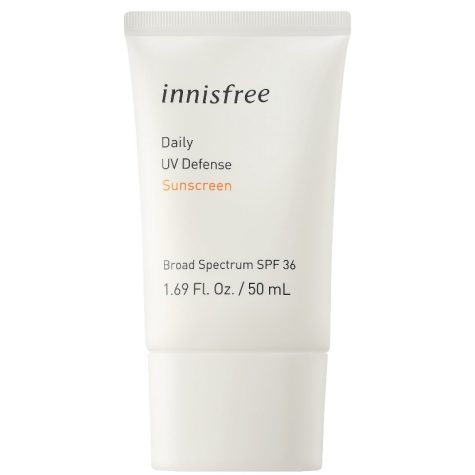 Innisfree Daily UV Defense Sunscreen SPF 36
Innisfree Daily UV Defense Sunscreen SPF 36
This chemical sunscreen is made with naturally derived ingredients such as sunflower seed oil, which provides lightweight hydration to the skin, and cica, which soothes the skin. It’s light on the skin, doesn’t leave a white cast, and leaves the skin with a nice dewy glow. It costs $15 and can be purchased in-store or online from Sephora.
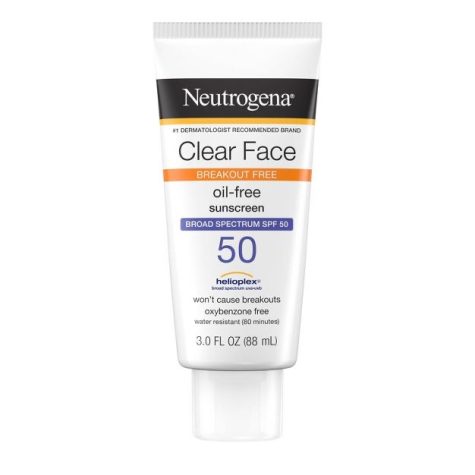 Neutrogena Clear Face Liquid Sunscreen Lotion
Neutrogena Clear Face Liquid Sunscreen Lotion
This chemical sunscreen is described as ideal for the face and body with a water-light texture that leaves a lightweight, matte finish. It’s also fragrance-free, non-comedogenic, and water-resistant (80 minutes). It is available for $10.99 at Target.
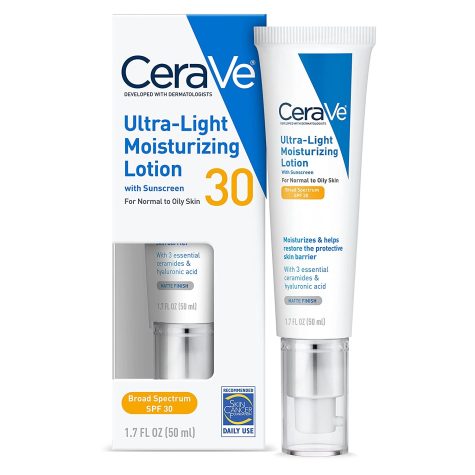 CeraVe Ultra-Light Face Moisturizing Lotion SPF 30
CeraVe Ultra-Light Face Moisturizing Lotion SPF 30
The CeraVe Ultra-Light Face Moisturizing Lotion is a non-comedogenic, lightweight moisturizer with sunscreen that contains ceramides and hyaluronic acid. It leaves the skin with a weightless matte finish. Ceramides assist in the restoration of the skin’s protective barrier while hyaluronic acid hydrates it. It is recommended by the Skin Cancer Foundation and can be purchased on Amazon or at Ulta.
Your donation will support the student journalists of Parkdale High School. Your contribution will allow us to cover our annual website hosting costs and publish some printed editions, as well.
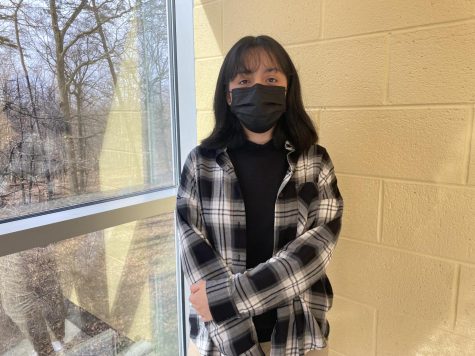
Lesli Carrasco-Merino is a junior at Parkdale, and this is her first year on The Paw Print staff as a reporter. She aims to provide informative articles...

